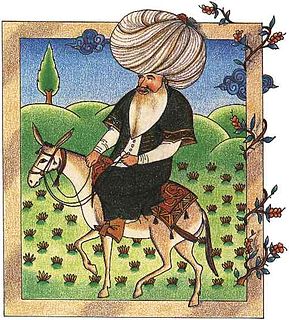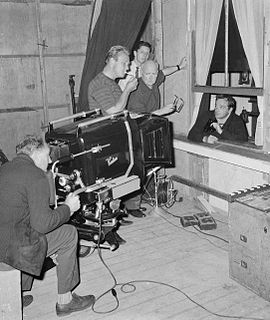A Quote by Idries Shah
If a pot can multiply. One day Nasrudin lent his cooking pots to a neighbour, who was giving a feast. The neighbour returned them, together with one extra one – a very tiny pot. 'What is this?' asked Nasrudin. 'According to law, I have given you the offspring of your property which was born when the pots were in my care,' said the joker. Shortly afterwards Nasrudin borrowed his neighbour's pots, but did not return them. The man came round to get them back. 'Alas!' said Nasrudin, 'they are dead. We have established, have we not, that pots are mortal?'.
Related Quotes
I make a lot of pots in a year's time and some of them are good and some of them are mediocre and some of them are bad. If they're really bad and I'd be ashamed of them, I throw them out, but if they're mediocre and they'll serve the purpose for which they're designed, that is, a mixing bowl or a soup bowl or a plate or whatever, I sell them. And this income from the sale of these pots permits me to go on and make other pots. It's even more important now that I've quit teaching, because I do not have a teacher's salary to fall back on.
In looking at these pots at the Field Museum, Alix [MacKenzie] and I both came to a conclusion individually but also collectively that the pots that really interested us were the pots that people had used in their everyday life, and we began to think - I mean, whether it was ancient Greece or Africa or Europe or wherever, the pots that people had used in their homes were the ones that excited us.
I'm striving to make things which are the most exciting things I can make that will fit in people's homes. And in that respect, working on the wheel is economically about the only answer I know, because one can, as Leach said, make 50 pots in a day. You can make 100 pots in a day. A really good potter can make 400 pots in a day.
I think back to some of the pots we made when we first started our pottery, and they were pretty awful pots. We thought at the time they were good; they were the best we could make, but our thinking was so elemental that the pots had that quality also, and so they don't have a richness about them which I look for in my work today. Whether I achieve it all the time, that's another question, because I don't think a person can produce at top level 100 percent of the time.
Other thing about [Field Museum of Natural History] which inspired was that in a group of pots you wouldn't see a single example of this kind of pot. You would perhaps see a case with 20 different examples. So you realize that these pots could be repeated again and again, and each time there would be minor variations in them.
We never had a catalogue; we never said we were going to duplicate these pots this year and next year and the year after that and so forth. We did make many pots which were repeated, but we allowed them to change and to grow as we changed and grew, and I think that was the big difference. And that's all right; we were working for ourselves. We didn't have anybody we had to pay.
In fact, when Bernard [Leach] would be called away to go up to London for something and we'd be living alone for a couple of days, we would dig into the storage areas in the house and we'd get out all the pots that we might not see in the course of our daily life, because we weren't using them in the house on a steady basis. But we found some fantastic pots in there tucked away, and we could look at them and examine them and handle them.
Things happen very quickly and they have to happen quickly in order to have vitality, which I think is essentially part of a good pot. But in addition it means that you can explore an idea and change it and then change it and then change it; I don't mean by changing the one pot, but you make one pot then you make another that's related to that; you make another - you can make 50 pots in a day and none of them are going to be carbon copies of any other, but they'll all be related because there's something going through your mind about the form on that particular day.
Looking back on it now, I understand why that was not possible [to express ourselves], because the pottery employed a dozen people, not all of whom are making pots. And these people had families, children, and they had to have a wage that would allow them to raise their family and they had to get a paycheck every Friday afternoon. So if we had not made pots that would sell it, would not have been possible for these people to be employed.
To the documentary director the appearance of things and people is only superficial. It is the meaning behind the thing and the significance underlying the person that occupy his attention... Documentary approach to cinema differs from that of story-film not in its disregard for craftsman-ship, but in the purpose to which that craftsmanship is put. Documentary is a trade just as carpentry or pot-making. The pot-maker makes pots, and the documentarian documentaries.
There is a religious principle: Love thy neighbour as thyself. But it's also an economic asset. If you've got a neighbour, you've got help, and this implies another limit. If you want to have neighbours, you can't have a limitless growth economy. You have to prefer to have a neighbour rather than to own your neighbour farm.

























